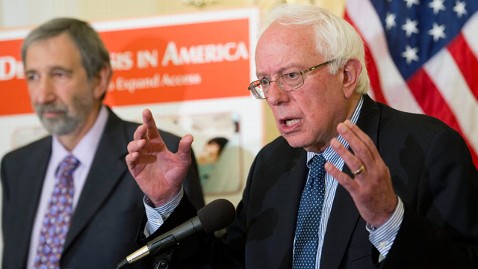Sen. Sanders: Fund Dental Care With Trading Tax

Image credit: Chris Maddaloni/Getty Images
Everyone agrees that more American kids need dental care. But nobody seems to agree on how to pay for it.
A new proposal by Sen. Bernie Sanders, I-Vt., would create a new tax on Wall Street and use the proceeds to extend comprehensive dental coverage to all Medicare, Medicaid and VA beneficiaries. It would also increase funding for school-based dental services and oral health professional student loans, as well as free up resources to establish mobile dental units, emergency room care coordination programs and initiatives recruiting dental professionals to low-income areas.
According to Sanders' legislation, funding for these programs would be drawn from a tax on non-consumer financial trading. The proposed tax, which would levy a $2.50 fee on every $10,000 of non-consumer trading such as credit default swaps, derivatives, and the sale and purchase of stocks and bonds, "would raise $288 billion over the next 10 years," according to a fact sheet from Sanders' team.
Sanders introduced the proposal on Capitol Hill on Thursday along with Rep. Elijah Cummings, D-Md.
"When we talk about the health care crisis in America, we often ignore a very important aspect of that crisis; that tens of millions of Americans are unable to access affordable dental care, and they suffer as a result of that," Sanders said in a news conference on Capitol Hill earlier today. "Today, by introducing what we believe is the most comprehensive dental care legislation in American history, we start addressing that issue."
Opponents of the tax have expressed concern about the drag that taxing speculation would put on the financial market. "It's going to make financial markets less efficient, and by less efficient I mean make it take longer for capital to be put to more productive uses, making things that people want and creating jobs, that sort of thing," said Mike Cannon of the CATO Institute.
Aside from inefficiencies in the financial market, Cannon also expressed concern that Sanders' legislation would negatively impact the effectiveness of the healthcare sector. "Obviously we need to make dental care available for seniors and for lower-income Americans, but the way to do that is not through government subsidies," he said. "That reduces the quality of care."
Sanders' team indicated that a speculation fee is not an innovation: The U.S. had a 0.2% tax on stock sales and transfers in place from 1914 to 1966 following the passage of the Revenue Act of 1914. Additionally, Sanders claims that such a fee would serve as a check on risky financial sector investments, thereby protecting Americans fiscally. Finally, such measures are already in place outside of the U.S. Specifically, England currently levies a 0.25-percent tax on financial transactions.
The bill will meet with opposition from lobbyists for the financial sector, as well as others concerned about the restriction of flow of capital. "The tax would hit Americans of all walks of life: workers saving in their 401(k) for retirement, parents saving for their children's education and retirees living on a budget," said Scott Talbott of the Financial Services Roundtable.